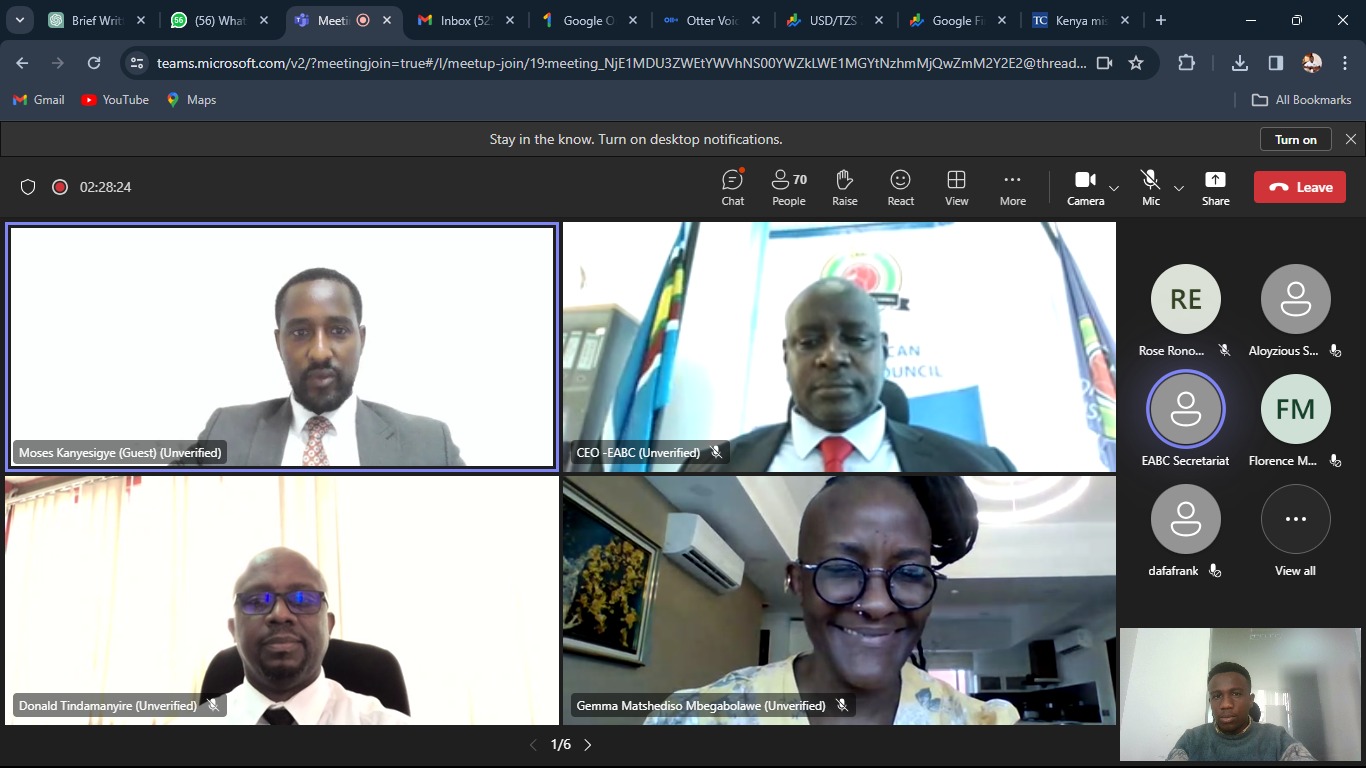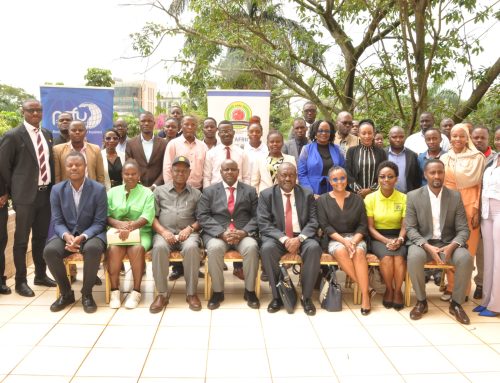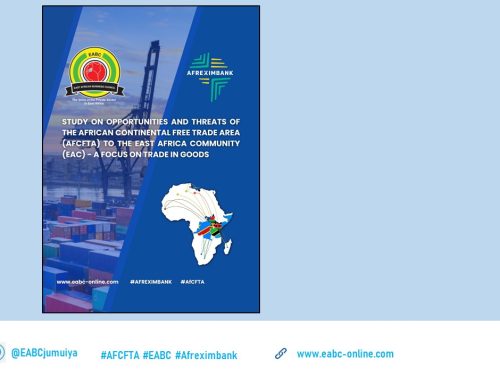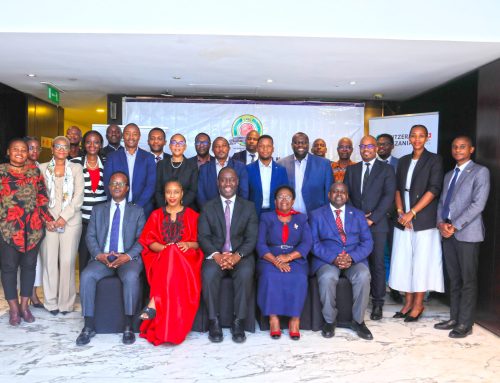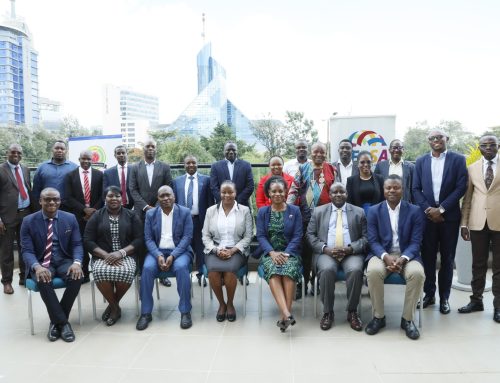Tuesday, March 26th, 2024: Youth and women entrepreneurs have applauded the African Union Summit for adopting the AfCFTA Protocol on Women and Youth in Trade. The entrepreneurs urged for inclusive financial solutions to boost their export capacity under the African Continental Free Trade Area (AfCFTA) during the webinar organized by the East African Business Council (EABC) in collaboration with the East African Women in Business Platform (EAWiBP) and in partnership with GIZ Support to East African Integration Program.
The AfCFTA 1.3 billion consumer market opens a new dawn to take advantage of the demographic dividend of women and youth entrepreneurs,” said Mr. John Bosco Kalisa, Executive Director of the East African Business Council (EABC), during the webinar titled “How East African Community (EAC) Small and Medium Enterprises (SMEs) can reap the advantages of AfCFTA.” He tasked East African SMEs to be well-prepared to produce more and trade competitively under the AfCFTA.
He proposed that the trade facilitation processes should be coordinated and seamless for SMEs to navigate complex customs procedures and Rules of Origin (RoO).
Donald Tindamanyire, Principal Customs Officer, expressed that the adjustment of the maximum cap under the EAC Simplified Trade Regime from USD 2000 to USD 5000 will be in harmony with the AfCFTA Simplified Trade Regime cap. This adjustment aims to facilitate increased trading activity among East African SMEs within both the EAC bloc and the AfCFTA region.
During the panel discussion, Ms. Nancy Amunga- Founder and CEO Danaida ltd explained that youth and women entrepreneurs require access to both finance and information in order to effectively participate in trading under AfCFTA.
In his contribution to the discussion, Mr. Tindamanyire stated that regional value chains that employ youth and women, representation of youth in AfCFTA implementation committees, support desks for entrepreneurs, studies to inform policy formulation, digital capacity development, and regional business incubation centers are essential.
Ms. Rose Ronah, International Trade Expert & Founder ,Trade Smart Consult stated that SMEs should learn to trade with EAC instruments to improve their capacity to trade under AfCFTA. She recommended leveraging technology to enhance competitiveness, networking, and aggregation facilities for SMEs to ensure continuous supply.
Ms. Gemma Matshediso Mbegabolawe – Regional Economic Communities Coordinator -AfCFTA Secretariat presented the AfCFTA Protocol on Women and Youth and the Protocol on Digital Trade adopted by the AU Summit. The Protocol aims to enhance inclusivity in trade and policymaking. She highlighted that 44milion SMEs are in Sub-sahara Africa (MasterCard Foundation) and initiatives such as export readiness trainings, Youth Symposiums, Women in Trade Conferences, Intra-Africa Trade Fair, and the Bishara Forum are aimed at promoting mentorship and facilitating business-to-business interactions for women and youth entrepreneurs.
She further emphasized that the AfCFTA is set to create a diversified market base and ease access to inputs and resources for entrepreneurs.
Mr. Kalisa also proposed for procurement policies to prioritize women and youth entrepreneurs, and reaffirmed EABC’s dedication to partnering with counterparts across Africa to empower SMEs with skills and business-to-business (B2B) opportunities.
Ms. Happiness Nankaya, Founder of AjA Limited, discusses exporting sisal under AfCFTA Guided Trade Initiative and stresses the importance of accessing financial schemes to boost export capacity.
Improving business partnerships and logistic connectivity were highlighted by Mr. Arnold Nyendwa, Founder of AfCON, and Mr. Charles Thuo, Founder of Apexloads INC, a trailblazing logistics technology company with a mission to revolutionize Africa’s logistics industry, respectively.
The webinar organized convened over 230 youth and women entrepreneurs who discussed the following proposals: the importance of the sports sector in youth employment, formalizing and sensitizing the informal sector, quick resolution and alert mechanisms on Non-Tariff Barriers (NTBs) for youth and women entrepreneurs, and access to finance for SMEs. The panel was moderated by Moses Kanyesigye, Regional Coordinator for SMEs, Women & Youth of East African Business Council (EABC).
The AfCFTA is poised to be a major catalyst for Africa’s structural transformation powered by greater market integration, it will cover a market of 1.3 billion people and a gross domestic product (GDP) of $2.5 trillion, across all 55 member States of the African Union. This will provide the required push to develop wide-reaching regional value chains with new or expanded opportunities for MSMEs, which account for 80% of African businesses and remain the backbone of production and employment. Simplified trade procedures and greater engagement will also support improved inclusion of informal businesses especially Women and Youth, in the formal economies.

